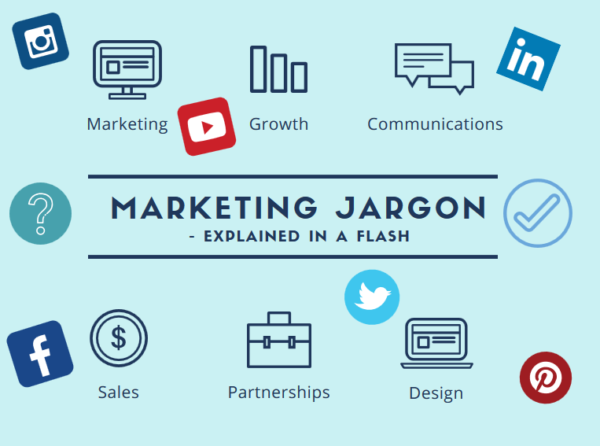There are a lot of terms in marketing that can look like marketing jargon…from CTA to ROI to SEO! But what do these terms mean, and is it important that you use and understand them?
Why marketers use these terms
Some of the marketing jargon that marketers use are important, specific terms that refer to a very particular method or aspect of marketing. This is especially crucial when it comes to digital marketing (such as blogging, social media, and online ads), because there is so much data to measure!
However, as you’ll come to see, some of the terms are a bit more vague, and may not be relevant to your business. So read on and see what terms you want to use when it comes to your marketing!
Marketing jargon and their definitions:
Content marketing: content marketing is the process of creating and using content to attract a customer! Content can mean lots of things – from blog articles, social media posts, videos, ebooks and more!
These aren’t just about selling, though. They can also educate your potential customers about your industry, and potentially even help them solve a common problem.
Conversion: this is when people complete the desired action on a website, such as filling out a form, purchasing a product, or signing up to a newsletter. Generally speaking, pages with high conversion rates are a good sign, while pages with low rates are performing badly.
CTA: this is a call-to-action. This can be a link, button or phrase that encourages customers to visit a website and become a lead (by downloading content, signing up to a newsletter, or contacting you to learn more). CTAs are very important for marketers because they will entice potential customers to take the next step. Common phrases include ‘buy now’, ‘sign up’ and ‘learn more’.

CTR – click-through-rate is another incredibly important term in marketing! This is a calculation that measures the number of clicks you receive on online ads. This is measured against the number of impressions that the ad has received. Again, a high click-through rate tends to be good, but you have to compare it to the number of conversions you get, too!
Deliverables – this is a term that is thrown around quite a lot in marketing! To put it simply, deliverables are the results of a project. So a deliverable could vary from the main objective of the project, or a small element like a document wrapping everything up. It’s quite a nebulous term!
Funnel – once again, this is a definition that can get a little bit tricky. A funnel refers to the many stages of buying.
First is the top of the funnel. At this stage, your potential customers have identified that they have a problem that needs to be solved, and want to know more. A good marketer will create content that will help the potential customer learn more about the problem, and start to provide the next steps for solving it.

The bottom of the funnel is when the potential customer is about to become an official new customer! At this point they can be given something to seal the deal, such as a consultation, a demonstration, or a free sample.
Impressions – you may have seen that your social media post or online ad got a certain number of impressions. This refers to the number of times people have seen your content.
However, impressions aren’t everything! For example, they are different from a click. So if your Instagram ad gets lots of impressions but few clicks, then it might not be as successful as it first appears.
ROI – we’re getting near the end now! ROI stands for return on investment. It’s what you calculate to figure out how profitable an investment has been. A simple method for determining ROI is this equation:

However, depending on what you’re calculating, this equation can change! The result is calculated as a percentage. If the ROI is negative, this means that the initiative is losing money.
SEO – finally, in our list of marekting jargon, we have the all-important SEO! We’ve discussed this before, so we’ll make this definition brief! This stands for Search Engine Optimisation. It’s a way for search engines like Google to check that your website is trustworthy. If it is, then your site is more likely to show up in the first few pages.
These are just some of the terms that marketers use. Will you be adopting any of them? If you’d like to learn more, or you want to discuss how you can be making the most of your marketing, then please contact me today!


Recent Comments